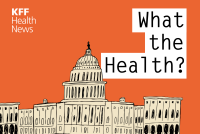Latest Morning Briefing Stories
How Your In-Network Health Coverage Can Vanish Before You Know It
One of the most unfair aspects of medical insurance is this: Patients can change insurance only during end-of-year enrollment periods or at the time of “qualifying life events.” But insurers’ contracts with doctors, hospitals, and pharmaceutical companies can change abruptly at any time.
KFF Health News' 'What the Health?': Maybe It’s a Health Care Election After All
Health care wasn’t expected to be a major theme for this year’s elections. But as President Joe Biden and former President Donald Trump secured their respective party nominations this week, the future of both Medicare and the Affordable Care Act appears to be up for debate. Meanwhile, the cyberattack of the UnitedHealth Group subsidiary Change Healthcare continues to do damage to the companies’ finances with no quick end in sight. Margot Sanger-Katz of The New York Times, Anna Edney of Bloomberg News, and Joanne Kenen of Johns Hopkins University and Politico Magazine join KFF Health News’ Julie Rovner to discuss these issues and more. Also this week, Rovner interviews Kelly Henning of Bloomberg Philanthropies about a new, four-part documentary series on the history of public health, “The Invisible Shield.” Plus, for “extra credit” the panelists suggest health policy stories they read this week that they think you should read, too.
A New $16,000 Postpartum Depression Drug Is Here. How Will Insurers Handle It?
A pill form of an effective drug for postpartum depression hit the market in December, but most insurers do not yet have a policy on when or whether they will pay for it. The hurdles to obtain its predecessor medication have advocates worried.
An Arm and a Leg: The Medicare Episode
On this episode of “An Arm and a Leg,” host Dan Weissmann breaks down the complicated and expensive world of Medicare with practical tips to pick the right plan and avoid penalties.
Biden Said State of the Union Is Strong and Made Clear His Campaign Is Off and Running
President Joe Biden used his roughly 68-minute address to Congress to counter lackluster public approval ratings and draw clear contrasts between his administration’s policies and those of Donald Trump and some congressional Republicans. Abortion and health care were in the spotlight.
Biden Team, UnitedHealth Struggle to Restore Paralyzed Billing Systems After Cyberattack
The cyberattack on a unit of UnitedHealth Group’s Optum division is the worst on the health care industry in U.S. history, hospitals say. Providers struggling to get paid for care say the response by the insurer and the Biden administration has been inadequate.
KFF Health News' 'What the Health?': The State of the Union Is … Busy
At last, Congress is getting half of its annual spending bills across the finish line, albeit five months after the start of the fiscal year. Meanwhile, President Joe Biden delivers his annual State of the Union address, an over-the-counter birth control pill is (finally) available, and controversy erupts over new public health guidelines for covid-19 isolation. Alice Miranda Ollstein of Politico, Sarah Karlin-Smith of the Pink Sheet, and Sandhya Raman of CQ Roll Call join KFF Health News’ Julie Rovner to discuss these issues and more. Also this week, Rovner interviews Neera Tanden, the White House domestic policy adviser, about Biden’s health agenda. Plus, for “extra credit,” the panelists suggest health policy stories they read this week that they think you should read, too.
Whistleblower Accuses Aledade, Largest US Independent Primary Care Network, of Medicare Fraud
A recently unsealed lawsuit alleges Aledade Inc. developed billing software that boosted revenues by making patients appear sicker than they were.
Readers Call on Congress to Bolster Medicare and Fix Loopholes in Health Policy
California Healthline gives readers a chance to comment on a recent batch of stories.
Hacking at UnitedHealth Unit Cripples a Swath of the US Health System: What to Know
Change Healthcare, a firm recently bought by insurance giant UnitedHealth Group, reportedly suffered a cyberattack. The company processes 14 billion transactions annually, including payments and requests for insurance authorizations.













